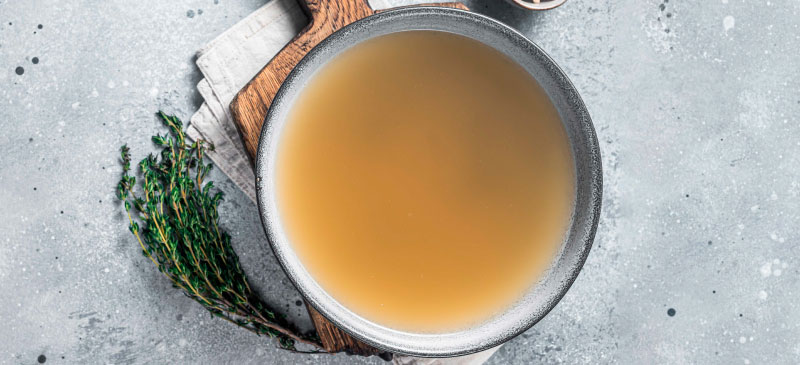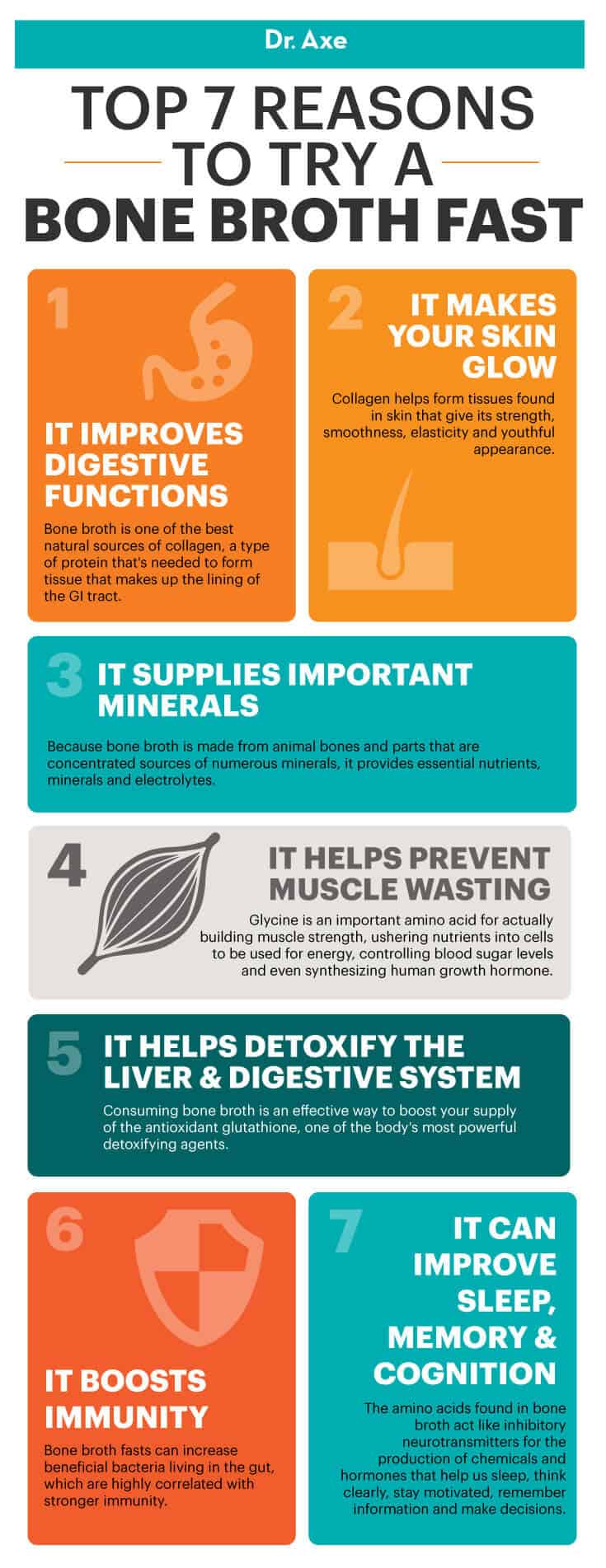
By now you might be familiar with bone broth and all this time-honored, traditional food has to offer — collagen, amino acids and numerous trace minerals, just for starters. Maybe you’re now looking to take things to the next level and try a bone broth fast, but you aren’t quite sure how to safely go about this.
As you’ll learn, bone broth is one of the most nutrient-dense, healing foods for the digestive system and therefore a great way to kick off a healthier way of eating and to help resolve symptoms related to poor digestion and other concerns.
What Is a Bone Broth Fast?
A bone broth fast involves drinking bone broth several times per day but not eating much other solid food.
Although it’s been consumed around the world in one form or another for thousands of years, bone broth is made from animal parts that in modern times are normally discarded. These include bones and marrow, skin and feet, tendons and ligaments — all of which aren’t edible on their own but make nutrient-packed additions to slow-simmering stock.
Bone broth is boiled slowly over several days — normally with veggies, an acid and fresh herbs in addition to animal parts — allowing all of the ingredients to release their stored nutrients. There are several kinds that are most popular, including chicken bone broth and beef bone broth.
Fasts are not for everyone, and sometimes certain kinds can pose risks since they involve consuming little nutrients due to greatly reducing calorie intake. However, if you make a good candidate, consuming bone broth is ideal for a fast because it’s chock-full of both macronutrients and micronutrients.
Within fish, chicken and beef bone broth, you’ll find amino acids (which form proteins) like glycine, arginine and proline; vitamins and minerals; collagen; electrolytes; and even antioxidants like glucosamine.
One of the things that makes a bone broth fast stand apart from other types of fasts is that it’s an ideal way to obtain more collagen, a type of protein needed to create healthy tissue found throughout the body. Collagen is found inside the lining of the digestive tract, within bones in bone marrow, in skin, and in the tissues that form joints, tendons, ligaments and cartilage.
Within collagen are other special nutrients, including amino acids like proline and glycine, plus gelatin — each of which has its own unique functions.
Benefits
Why is bone broth good for fasting? The benefits of consuming bone broth while fasting include:
- stronger immunity against common illnesses or allergies
- reduced symptoms related to digestive disorders like leaky gut syndrome, IBS or IBD
- generally enhanced digestion with fewer cases of bloating, diarrhea, gas, acid reflux and constipation
- healthier joints, ligaments and tendons
- more youthful-looking skin thanks to collagen
- stronger bones
- higher intake of importance minerals like calcium, phosphorous, magnesium, potassium and more
Before we dive in to the advantages of consuming bone broth, let’s first talk about the many benefits of fasting. Fasting, when done right and by the right people, has been shown to promote better health by:
- improving weight loss and helping with weight maintenance
- reducing fasting insulin levels and normalizing blood sugar activity
- lowering cholesterol
- promoting the secretion of human growth hormone, which is important for burning fat
- having positive effects on body mass and health markers in professional athletes
- reducing risk for diseases like diabetes, cancer and heart complications
- normalizing appetite by controlling hunger hormones like ghrelin
- lowering triglyceride levels
- even slowing down the aging process and increasing someone’s life span
Here’s more about how a bone broth fast can benefit you:
1. Improves Digestive Functions
Bone broth is a natural source of collagen, a type of protein that’s needed to form tissue that makes up the lining of the GI tract. Collagen protects and soothes the lining of the digestive tract and can aid in healing leaky gut syndrome, IBS symptoms and acid reflux.
It’s been shown that patients with IBD produce less collagen in their digestive systems. Increased intakes are capable of helping strengthen and normalize mucus membranes in the GI lining, closing tiny junctures and stopping indigested food particles and chemicals from leaking out of the gut into the bloodstream.
When collagen breaks down, gelatin is formed, which is known to help people dealing with food allergies and sensitivities to foods, such as cows’ milk and gluten. Gelatin in bone broths contains “conditional” amino acids called arginine, glycine, glutamine and proline, which have certain anti-aging effects and promote probiotic balance and growth.
2. Makes Your Skin Glow
Collagen helps form tissues found in skin that give it strength, smoothness, elasticity and youthful appearance. In fact, studies have found that higher intakes of collagen are associated with improvements in skin barrier functions, increased hydration and reductions in signs of aging, including wrinkles, fine lines and sagging.
Although you likely won’t notice any improvements within just a few short days, higher collagen intake is also known to decrease the appearance of cellulite. Cellulite develops due to lack of connective tissue, which is made from collagen.
3. Supplies Important Minerals
Some fasts fail to provide important trace minerals that we need for ongoing energy, immunity, digestion and more. Because bone broth is made from animal bones and parts that are concentrated sources of numerous minerals, it provides minerals and electrolytes, including calcium, phosphorous, magnesium, sodium, potassium, sulfate and fluoride.
This can help prevent an electrolyte imbalance, dehydration that can occur during a fast, fatigue, brain fog, moodiness, and muscle spasms or weakness.

4. Helps Prevent Muscle Wasting
It’s possible during a fast to wind up losing some weight, which can really be due to muscle (and therefore strength) loss. Luckily during a bone broth fast, you still obtain amino acids, such as glycine and proline, that help prevent the breakdown of valuable protein tissue found in muscles.
In fact, a bone broth fast might even help you with muscle recovery, reduce joint pain (since collagen is known to fight symptoms of arthritis) and even relax tense muscles naturally.
Glycine is an important amino acid for actually building muscle strength, ushering nutrients into cells to be used for energy, controlling blood sugar levels and even synthesizing human growth hormone.
Because glycine plays a role in the process of gluconeogenesis, which takes place in the liver, it can provide cells with an energy source even when little calories or carbohydrates are consumed. This, in turn, can help prevent sarcopenia, muscle wasting as we age.
5. Helps Detoxify the Liver and Digestive System
Consuming bone broth is an effective way to boost your supply of the antioxidant glutathione, one of the body’s most powerful detoxifying agents.
Glycine is a precursor needed for the production of glutathione, which helps the liver flush out excess chemicals, stored hormones and other waste. Other minerals, acids and electrolytes can also boost detoxification processes, including acetic acid (found in apple cider vinegar, which is often added to bone broth recipes), magnesium and sulfate.
6. Boosts Immunity
Bone broth fasts can increase beneficial bacteria living in the gut, and gut health is highly correlated with stronger immunity (not to mention many other aspects of health, like hormonal balance and weight regulation). Good bacteria in the gut (often called probiotics) can actually turn on certain genes that help regulate inflammation and turn down numerous types of unwanted symptoms.
7. Can Improve Sleep, Memory and Cognition
The amino acids found in bone broth act like inhibitory neurotransmitters for the production of chemicals and hormones that help us sleep, think clearly, stay motivated, remember information and make decisions.
Higher intake of glycine, for example, has been found to help people who can’t sleep get better rest, lower symptoms of anxiety, improve mental performance and even enhance memory.
Bone broth is also a great way to obtain electrolytes, including potassium, magnesium and sodium, that sustain energy and assist in muscle, nerve, digestive and cognitive functions. Magnesium, for example, is known to help decrease headaches, restlessness, muscle spasms during sleep, muscle pains and digestive discomfort.
How to Do It
New to drinking bone broth and/or fasting? Here are answers to some frequently asked questions about the process:
How long should you do a bone broth fast?
READ RELATED: The 29 Best Housewarming Gifts Under $150
Most people do this type of fasting for a period of three to four days, while consuming several quarts of bone broth daily and eliminating many problematic foods.
Plan to fast for a period of three to four days. This amount of time is best for helping kill off harmful bacteria in the gut, repair the GI tract and repopulate the gut with probiotics.
Longer than this might be tolerable for some, but it also raises the risk for more problems, fatigue and deficiencies in certain groups of people. If you plan on doing intermittent fasting, a longer duration up to 90 days might be beneficial.
How much bone broth should you drink during a fast?
Each day you ideally should consume between three to four quarts of bone broth. Making the broth yourself is the best way to ensure it’s high-quality and doesn’t cost you too much.
About 12 ounces is the proper amount for one serving. You should consume this 12-ounce serving about five times a day — 7 a.m., 10 a.m., 1 p.m., 4 p.m. and 7 p.m., for example.
What foods should you definitely avoid while fasting?
While fasting, you’ll ideally not eat anything at all, unless you’re doing intermittent fasting and it’s within your “eating window.”
It’s ideal to eliminate all problematic and inflammatory foods during a bone broth fast, including grains, packaged/processed snacks, added sugar, FODMAP foods/complex carbohydrates, sweetened drinks, dairy and refined vegetable oils.
Within your eating window, you can include as many healthy fats, clean proteins, fruits and veggies as you choose.
Can you drink water on a bone broth fast?
Drinking water is definitely encouraged. This helps keep you hydrated and can make fasting easier in general.
How should you make and store bone broth?
Plan to make your broth one to two times in a large batch and refrigerate/freeze small portions to keep them fresh throughout the fast. Drink broth throughout the day as you’d like, adding ingredients like salt, pepper, vinegar and seasoning for extra taste.
You can reheat cooled or frozen stock on the stovetop, whisking it and skimming off the fatty/oily surface if you’d like to (although this is nutrient-dense and should be kept for cooking later on).
Are there different methods of doing bone broth fasting?
Bone broth fasts can be customizable to fit your needs and goals. They don’t require buying lots of expensive supplements, going for very long periods without eating “normally,” or much risk and investment.
Here are several ways you can try a bone broth fast safely:
- You may want to practice intermittent fasting by going without any food for 12–15 hours of the day (usually through the night and morning), although this isn’t necessary for everyone.
- You might choose to utilize a combination of different stocks (chicken bone broth, beef bone broth and fish stock, for example) or stick with exclusively beef stock if you have a very sensitive system since this seems to be most well-tolerated.
- Try a bone broth fast as part of the GAPS diet protocol, eliminating problematic foods to test your response, or include bone broth in a FODMAP diet or specific carbohydrate diet (SCD) if you know certain carbohydrates cause your symptoms to worsen.
- It’s also a good idea to consume probiotics/fermented foods during the fast and afterward to boost intake of healthy bacteria.
- Even if you aren’t looking to do a formal fast but still want to take advantage of bone broth’s benefits, you can start by consuming eight ounces of broth once or twice daily as a soup, a plain beverage or within other recipes.
Who Should Do It?
How do you know if a bone broth fast is right for you? The people who can benefit most from fasting with bone broth include:
- those with digestive disorders (like leaky gut syndrome, inflammatory bowel disease or IBS)
- anyone struggling with food allergies and sensitives
- those prone to frequent digestive symptoms, like bloated stomach, gas and constipation
- anyone with signs of low immune function, including frequently getting sick, or having asthma and recurring respiratory issues
- those dealing with autoimmune disorder symptoms, fatigue, sluggishness and problems sleeping well
- people reacting to negatively to medications
- those with joint pains or arthritis
- anyone looking to gain more energy, improve the appearance of skin and feel more clear-headed
Bone broth can be included in basically any healing dietary program as an effective way to help heal the digestive system, reduce fermentation in the gut, lower gas accumulation, and prevent gut permeability and inflammation
Many who have had success with other types of fasts or protocols, including the GAPS diet or SCD, will likely also benefit from trying a bone broth fast. These are just two examples of diet elimination protocols that offer serious benefits for those who are struggling with compromised digestive and immune systems.
Bone broth is a popular addition to a healing diet because it’s very easy to metabolize, free from common allergen ingredients and a rich source of nutrients that are easy to miss out on when eliminating certain things from your diet.
Protocols such as a FODMAP diet or SCD diet work by eliminating most troublesome carbohydrates and common food allergies, while including specific types of carbs that are easy for most to digest and metabolize, along with plenty of nutrient-dense vegetables, healthy fats, clean proteins, fresh herbs and broths/stocks.
Maintenance
Once you’ve completed a bone broth fast, you’ll be in better shape to start a healthier way of eating that eliminates certain ingredients you might have realized caused you discomfort.
After the three to four days of fasting are over, you can continue to consume at least one to two cups of broth daily and also keep fermented foods/probiotic supplements in your routine to prolong your results.
In some ways, a bone broth fast can act like an elimination diet, helping pinpoint which foods might trigger symptoms like bloating, low energy or diarrhea.
Of course, it’s not sustainable to fast on bone broth for long periods of time, but you can follow a bone broth fast several times per year if you find it helpful to kick-start a healthier eating plan.
Long term, you want to focus on eating a healthy diet that promotes overall gut health, meaning one that includes foods such as:
- vegetables
- fruits
- herbs
- spices
- quality proteins
- nuts
- seeds
- green tea
- herbal teas
Risks and Side Effects
While fasting has many advantages, certain people are not good candidates for a bone broth fast (or any other fast, for that matter). Those who should avoid doing a bone broth fast include:
- anyone with hypoglycemia
- women who are pregnant or breast-feeding
- anyone who is underweight or recovering from a serious illness involving malnourishment (such as an eating disorder or digestive disorder)
- anyone with diabetes (without talking with a doctor first at least)
- people who rely on taking medications daily should also get clearance from their doctors, since some medications require eating solid foods
Remember fasting is different for every person, and there’s no concrete way to do one. Try to use common sense, and follow these tips to yourself safe:
- Eat if you’re feeling weak or very hungry.
- Try to get enough sleep and rest.
- Don’t overexert yourself or exercise vigorously. (It’s a good time to take it easy.)
- Simply listen to your body.
Conclusion
- A bone broth fast means you consume bone broth several times per day but not much other solid food.
- Most people do best fasting for a period between three to four days, during this time consuming several quarts of bone broth daily and eliminating many problematic foods.
- One of the things that makes a bone broth fast stand apart from other types of fasts is that it’s an ideal way to obtain more collagen, a type of protein needed to create healthy tissue found throughout the body.
- Combining bone broth and fasting has some of these advantages: may help promote weight/fat loss, can promote gut health and improve digestion, makes your skin glow, supplies important minerals, prevents muscle wasting, supports liver function, and helps promote restful sleep and cognition.
Source:









